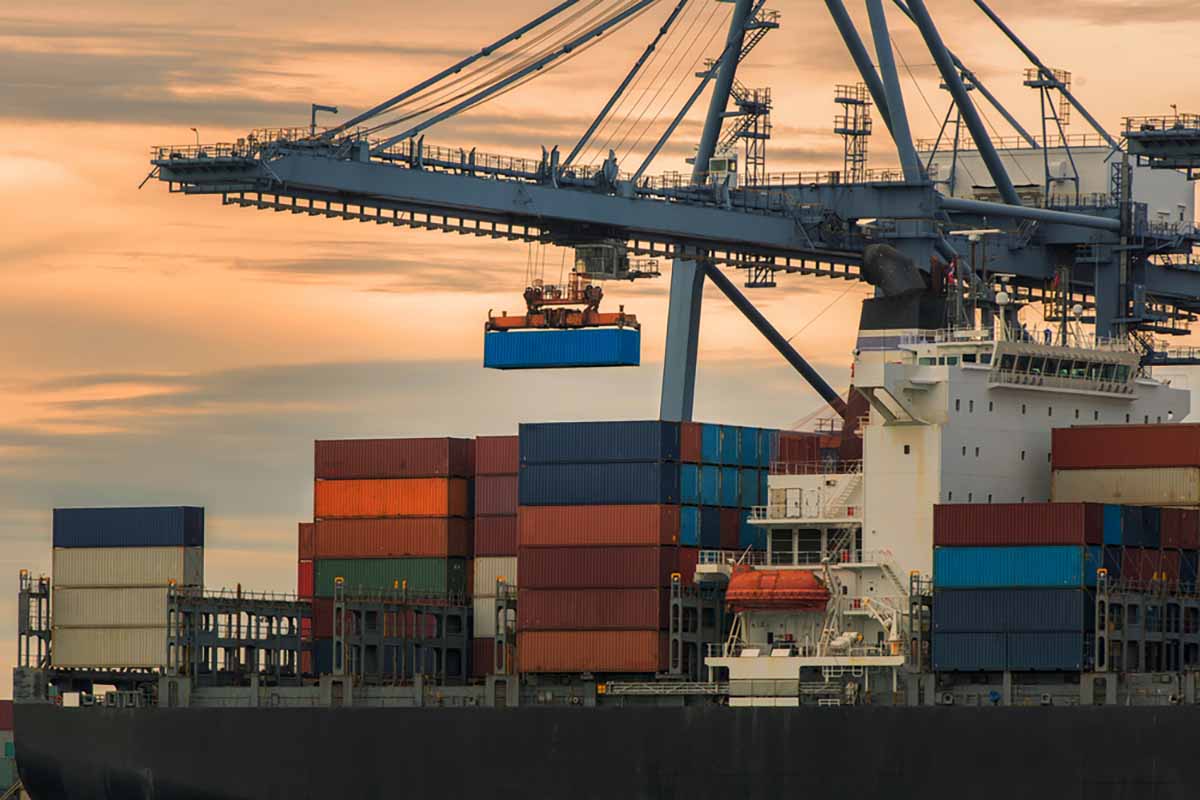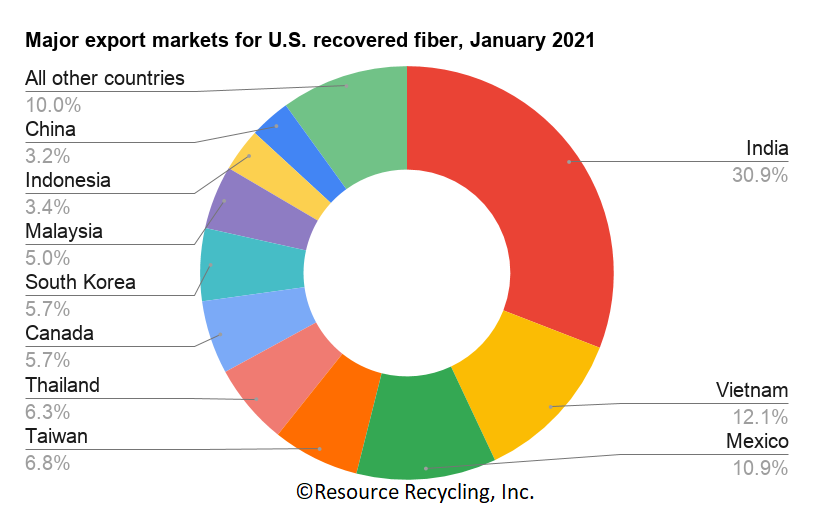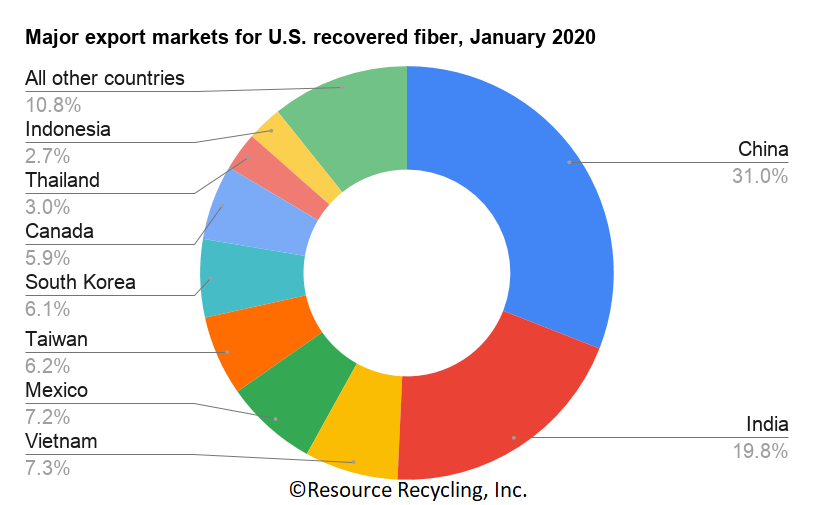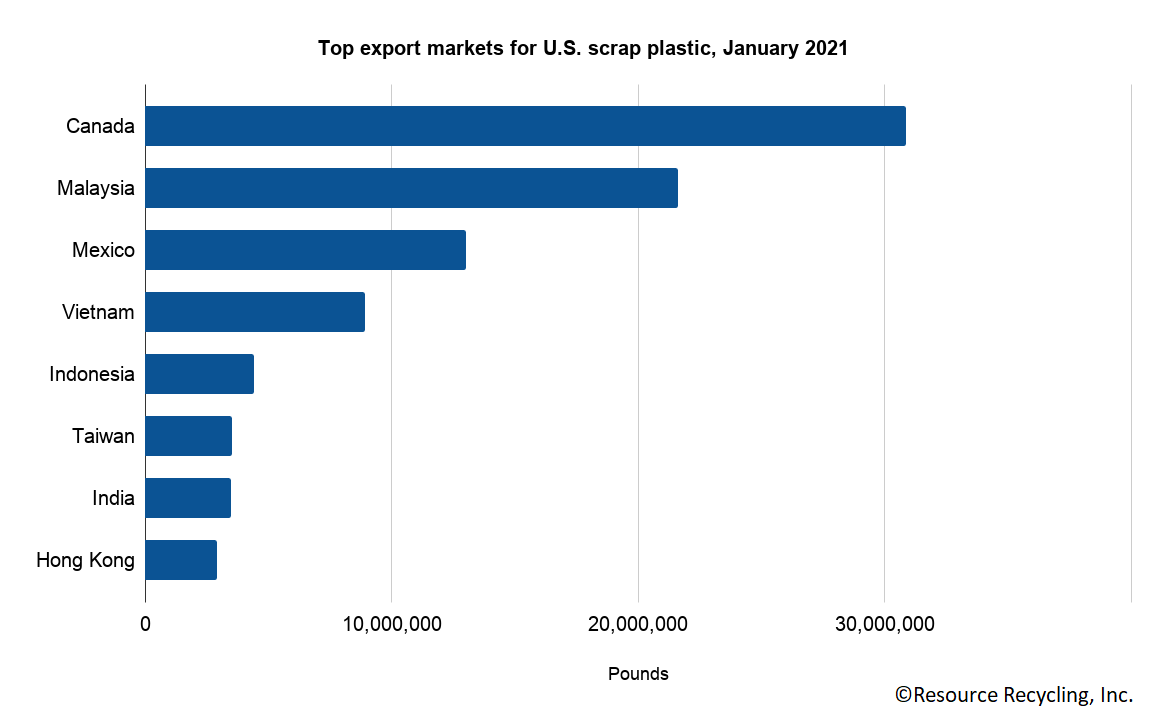
U.S. exports of recovered fiber were up slightly in January 2021 compared to the previous year. | anek.soowannaphoom/Shutterstock
Exports of U.S. scrap paper and plastic increased in January 2021 compared with 2020, despite China’s exit from the recovered paper market and new Basel Convention regulations on plastic shipments.
Export figures covering January 2021 were released this month by the U.S. Census Bureau, part of the Department of Commerce.
The January trends come after both 2020 and 2019 brought historic drops in recovered fiber and plastic exports.
Other countries fill China’s fiber void
Recovered fiber exports totaled 1.40 million short tons in January 2021, up slightly from 1.38 million short tons in January 2020. That’s despite a substantial shakeup in where the materials were shipped.
In January 2020, China imported 427,000 short tons, or about 31% of all U.S. exports of recovered fiber. But China implemented an all-out ban on recovered fiber imports at the start of this year, and U.S. trade figures show only 45,000 short tons exported to China in January 2021. That’s about 3% of all U.S. recovered fiber exports for the month. The year-over-year decrease is nearly 90%.
Despite the curtailment of that export market, U.S. exports were up slightly, because other countries brought in significantly more material than they have in the past. For example, India brought in 432,000 short tons, up substantially from 273,000 short tons a year earlier. Shipments to Vietnam increased from 101,000 short tons in January 2020 to 170,000 short tons this year. Exports to Malaysia increased sixfold in January 2021 compared with the same month in 2020.
The early export trends are in line with predictions that were shared during a Bureau of International Recycling session last fall.
By country, the largest importers of U.S. recovered fiber in the first month of this year were India (432,000 short tons), Vietnam (170,000), Mexico (153,000), Taiwan (95,000), Thailand (89,000), Canada (80,000), South Korea (80,000), Malaysia (70,000) and Indonesia (47,000).
(Story continues below charts.)


Plastics shipments continue despite Basel changes
In January, new rules covering international scrap plastic shipments took effect. The rules are part of the Basel Convention, a global pact that governs how shipments of certain types of hazardous waste are regulated between nations. The new plastic regulations were approved in 2019.
Countries that are party to the convention have been implementing the new Basel rules into their domestic laws. Under one reading of the Basel Convention, scrap plastic exports from the U.S. – which is not a party to the convention – to most Basel-party countries became illegal in January.
Despite the Basel changes and the resulting global exports turmoil, U.S. scrap plastic exports in January totaled 105 million pounds, up from 99 million pounds in January 2020.
The bulk of exports went to Canada, which brought in 31 million pounds, or about 30% of all U.S. scrap plastic exports. Canada and the U.S. last year negotiated an agreement to continue scrap plastic trade between the two countries despite the Basel changes.
The Census Bureau data show U.S scrap plastic shipments to numerous other Basel-party countries continued, despite the new rules. Exports to Malaysia, which is a party to the convention, totaled 22 million pounds, roughly flat year over year. Other top importers, including Vietnam and Indonesia, are also Basel-party countries. More than 180 countries are party to the convention, leaving the U.S. in an extremely small minority.
Regulatory action within Malaysia since January suggests the country could reduce its imports in the months to come. According to a Feb. 22 letter from the Malaysian Department of Environment, translated by the Malaysia Plastic Recyclers Association, the Malaysian government as of late January has incorporated the Basel amendment into its domestic laws.
Mexico, which is part of the Organization for Economic Co-operation and Development (OECD), was also one of the top importers. OECD countries can have special rules for trade under the Basel regulations. But the rules have been unclear over how trade between OECD countries would be impacted by the plastic amendment. The U.S. disagreed with other OECD members last year over whether the Basel plastic amendment should apply to U.S. trade with OECD countries, and the group did not come to a consensus before the amendment took effect this year.
The top scrap plastic importers of U.S. material in January 2021 were Canada (31 million pounds), Malaysia (22 million), Mexico (13 million), Vietnam (9 million), Indonesia (4 million), Taiwan (4 million), India (3 million) and Hong Kong (3 million).

More stories about exports
- Malaysia fully halting US plastic scrap imports
- Some tariffs suspended, metal duties coming this week
- Tariffs on Canada and Mexico take hold



